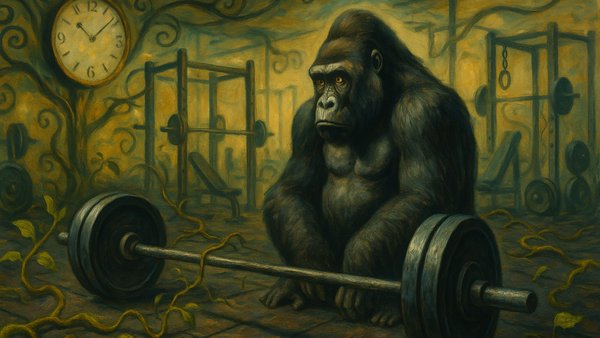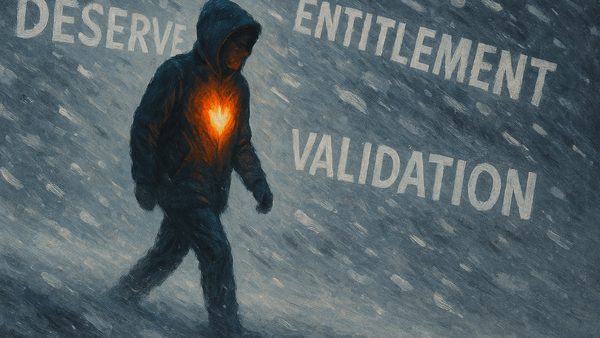Dump Privilege, Embrace Responsibility
If you believe in the modern concept of privilege, you can't live a self-determined life. Learn to assume responsibility at all times and liberate yourself from external manipulation.

I believe that every individual is absolutely and solely responsible for their own beliefs, thoughts, words, and actions, no matter under which circumstances, in which country, culture, or family they were born. We’re responsible for all the different factors that compose our current life situation. Therefore, we’re responsible for anything and everything that happens with us or to us. Because it’s our own beliefs and actions that have brought us there. Life was given to us and it’s up to you to make the most of it.
This holds true even if one’s current life situation is heavily influenced by seemingly particular fortunate or unfortunate preconditions received upon birth. Because what we perceive as fortunate or unfortunate is nothing but an evaluation by a biased society, typically due to its limited ability to accept and value what lies outside of predefined norms.
For example, most physically or mentally disabled people are capable of living a fulfilling and happy life, including the provision of distinct value to society, sometimes to an even greater extent than a person who is considered “normal”. Check out Sean Stephenson, Stephen Hawking, David Beckham, Andrea Bocelli, or Ludwig van Beethoven (the list is endless, these are just a few of my favorites). These people didn’t blame the imaginary illusion of unfortunate circumstances. They assumed responsibility, took life as it came. They made the most out of it and found wild success and served mankind with their invaluable contribution.
The Illusion of Privilege
A popular adversary to this belief of responsibility is the concept of privilege. Privilege means a special right, advantage, or immunity granted only to a particular person or group. This undoubtedly exists. In fact, privilege is an integral part of human societies. Privilege simply means the symptoms of the cumulative efforts of an entity and its ancestors over a certain period of time within a particular system. Privilege is inevitable. By definition, every being in this world is privileged in one way or another.
For example, an average person of the London middle class has the privilege of easy access to universities, thus the UK job market and all the amenities of the average UK society, compared to a Kenyan fisherman. The fisherman on the other hand is privileged over the Englishman in terms of the simplicity of his life, the fresh air he breathes, the daily physical activities he performs, the recognition and respect he receives from his peers, the direct connection to nature he cultivates and the prices he pays on local markets. With enough effort and applied adaption, both of them could overcome the hindrances of privilege and live each other’s lives.
I was so fortunate to meet and talk to several fishermen and their families in Morocco and Indonesia. Most of them radiated a distinct mixture of serenity and contentment. Which I can’t quite say even about a fraction of the people I met in the Western corporate world. Certainly a highly subjective experience, but nevertheless an important perspective. Does any of these fishermen need the privilege of six-year university degrees to develop the ability to work in an office? The privilege to own 1,000$ stainless steel cell phones with games like Candy Crush and TikTok notifications? The privilege of TV shows, cocktail bars, pornography, and tax declarations? The privilege of casual protected promiscuous sex without building sustainable connections and family? Doubtful. Although one might be able to lure them with the temptations of material possessions and sensual experiences to believe in the illusion of privilege.
When I spent a month in Morocco in 2016 a bottle of water was the equivalent of about 2 USD in Marrakech—for me as a European. When I had a local buy it, he would spend no more than 50 cents. So the local is privileged in this regard. He has this privilege because he and his ancestors have gained it over time. I didn’t speak any Arabic or French, wasn’t married to a Moroccan woman, haven’t started a local business or contributed in any other way to Moroccan society. On which basis could I expect or demand any of the local privileges?
This holds true even within a single society. Every individual has a different set of privileges, depending on a variety of factors such as health, financials, sex, intelligence, strength, age, education, race, family, reputation, religion, political view, character traits like perseverance, and so on.
Privilege is always limited to a particular system. Some entity that controls the system defines a certain situation, process, status, accomplishment or lifestyle worth achieving within the given framework. Privilege is neutral. Nevertheless, the meaning of the term has been contorted and perverted and got moral connotations assigned to serve certain individuals’ agendas like blame and victimhood.
The contorted perception of privilege assumes that the specific standards, rules, and conditions of a particular system by default represent the material, moral, or spiritual norm for any individual, no matter their heritage, origin, or life situation. It disregards the possibility that different people have different aspirations. It also disregards the investments and contributions to society that privileged individuals or groups and their ancestors have made over time, in lots of cases with considerable sacrifices. Moreover, it fosters the impression that happiness, meaning, and salvation can only be found within the framework of systems that privilege others. It also drives the desire to institute artificial and enforced equality by introducing statutory privileges that don’t address one’s actual core needs and desires because they were not earned organically through effort.
In summary, if you focus on the concept of privilege you castrate yourself as being the captain of your own ship. You resent those people who have become successful within their own systems according to their own definition of success. Because you struggle to achieve the same success and don’t question either what success means to you or within what kind of system you actually desire to operate. And lastly, you pity those who blame a certain attribute of their person for an undesired life situation or absence of success instead of taking charge and making the changes in their lives they want to see. You make someone else responsible for your luck and merits. By doing so, you cut yourself off from your ability to transform your life in a way that you see fit, to make the most out of it, to gain privilege within a given system or one you create, your own sphere of activity and influence.
Always Assume Responsibility
Now, whether or not you share this perception of mine, it is wise to generally assume responsibility. At any time, in any place or situation. Why? Simply because it has staggering positive effects on your perception of self, your life, and your surroundings.
It helps you to live in the present moment by directing your attention to the situation at hand, instead of spiraling off into a highly subjective past or an imaginary future. If you are responsible, you are much more likely to take action to create situations that serve your needs. If you refuse responsibility and assign it to external factors, you’re much more likely to complain, grieve, or produce anger about the past and the things that have led to your current life situation or create highly emotional expectations towards the future, hoping some external force will handle them.
You also take much better care of yourself, both your body and mind. You make much clearer, precise, and meaningful decisions and your actions are overall much more sustainable and productive. For years, I’ve been wearing a tooth protector at night because I grind my teeth as a result of years of orthodontic treatment during my early teenage years to “correct” a fully functional bite to a more aesthetically pleasing appearance. Sure, I could blame the orthodontist, my parents, or my social surroundings, possibly sue any of these parties, all the while developing more and more anger and animosity–aka live in the past or future. Far healthier and wiser is to assume full responsibility for my life situation. Therefore, I don’t develop any resentment against these other parties (past) and I don’t plan to seek restitution or revenge (future). I rather clean my teeth carefully, make sure to wear that tooth protector every day, and go to checkups regularly. Which version of myself will have the healthier self-perception, emotional state, and set of teeth 20 years from now, the one seeking restitution and treatment or the one taking care of their teeth?
Dump the common distorted concept of privilege. It can’t liberate you. Responsibility can. Assume it. Embrace it. At all times.
Did you enjoy this article? Please consider contributing to this publication’s financial freedom.
Flows straight into content, not coffee.




